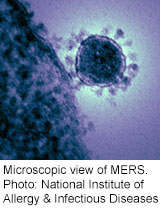
SATURDAY, May 17, 2014 (HealthDay News) —
A third U.S. man has tested positive for the MERS virus but shows no signs of the illness, federal health officials reported Saturday.
A business associate of the man who brought the first known case of the Middle East Respiratory Syndrome coronavirus to this country in late April, the Illinois man tested positive for the virus on May 16, officials from the U.S. Centers of Disease Control and Prevention said in a statement.
The first case was diagnosed in a health care worker who had traveled to Saudi Arabia and returned to the United States before falling ill and being hospitalized in Indiana. The Illinois man has not traveled outside the United States and has not needed medical care, but lab tests spotted the infection in his blood, CDC officials said.
The Illinois man probably got the virus from the Indiana patient and developed antibodies to fight the virus, CDC officials noted. The men had two business meetings together before the first man fell ill, officials added.
A second case was diagnosed in a Florida man on May 11. A health care worker, the man had also traveled to Saudi Arabia before he was confirmed to have the MERS virus.
“This latest development does not change CDC’s current recommendations to prevent the spread of MERS,” Dr. David Swerdlow, who is leading the CDC’s response to the infection, said in a statement released Saturday. So far, more than 570 people have fallen ill with the virus and 172 have died, most of them in Saudi Arabia.
The health risk to the general public is very low, federal officials have said, because the virus is only passed through close contact.
The second U.S. patient worked in a facility in Saudi Arabia that cared for MERS patients. The patient was visiting family in central Florida before entering the hospital. The patient had traveled from Saudi Arabia to London to Boston to Atlanta, before reaching Florida, officials said.
The patient felt unwell on a May 1 flight to London, but sought care in Orlando. The CDC said it has notified all passengers on the affected flights to be on the lookout for symptoms.
MERS symptoms typically include shortness of breath, coughing and fever.
One-fifth of all MERS cases have occurred among health care workers, CDC officials have said.
On April 28, another U.S. health care worker who’d had close contact with MERS patients in Saudi Arabia was admitted to an Indiana hospital and was later diagnosed with the respiratory ailment.
He has since been released from Community Hospital in Munster on Friday.
MERS kills about one-quarter of the people who contract the virus, according to CDC officials.
In some countries, the virus has spread from person to person through close contact, such as caring for or living with an infected person. But, there’s currently no evidence of sustained spread of MERS in general settings, the CDC has said.
Camels have been identified as carriers of MERS, but it’s not known how the virus is being spread to people.
More information
For more on MERS, visit the World Health Organization.
Copyright © 2026 HealthDay. All rights reserved.

